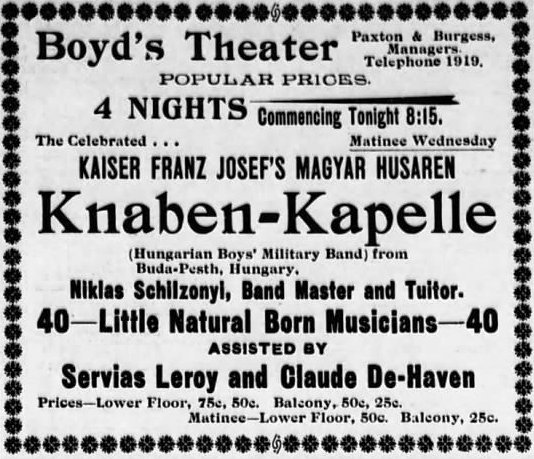LIFE IS SERIOUS FOR THEM
Routine of Discipline Makes Men of Forty Little Boys.
BEHIND SCENES WITH THE BOYS' BAND
The Omaha Daily Bee, Omaha, Nebraska, March 24, 1898
Published at DVHH.org 29 May 2020 by Jody McKim
Pharr
Military Training of the Youngsters Who Have Entertained Omaha Audiences with Their Musical Ability During Week.

Forty little Austro-Hungarians dressed In the gay red military uniform of their native land, deporting themselves like grown-up soldiers and playing horns and drums with a great deal more skill than many men a score of years older, have been the attraction this week at the Boyd.
This band is a bit of Europe brought to America.
The leader, Herr Mikel Schilzonyi, is an officer In the Austrian army
and speaks very little English. The boys' tutor, Herr Nuessbaum,
speaks only a few words' of English and none of the boys can converse In English. One of the little fellows sings English words to the tune of "There'll Be a Hot Time In the Old Town Tonight, " and this unusual accomplishment excites the envy of all his less precocious companions.
These boys are from a school which is maintained by the Austro-Hungarian government at Billed, a Saxon settlement 500 miles south of Buda Pest.
Into this school all boys who show unusual talent for music are put with the intention of training them for musicians In the Austro-Hungarian army. The forty boys who make up the Knaben- Kapelle were chosen from this school, and the consent of the government and the boys' parents had to be secured before they could be removed from the
school and brought to tour America. The youngest of the boys, Mikel Braun, the little drummer, 'la only 6 , end the oldest , Magyar Knaben Mikel Bonn Is 14.
So complete and thorough Is the musical education of this band that the players orchestrate their own parts and play 300 different selections. When they first came to America they played only classical music, but the manager thought popular airs should be intermingled with the classical and in every short time the leader was ready to play selections varying from Sousa's marches to rag songs.
UNDER MILITARY RULE.
Herr Schilzonyi
exercises the strictest military discipline over these boys and they never give him any trouble. Obedience has been taught to them from the day they entered the school at Billed and they deport themselves like men In contrast to the conduct which might be expected from such young boys. Each day they rise at 6:30, have prayers, eat breakfast at 7:30, attend practice from 9:30 till 11, have dinner at 12 and school in reading, writing and arithmetic under
Herr Nuessbaum
from 2 till 3:30. After school they spend the remainder of the afternoon In walking and riding to places of interest. At 6:30 supper Is eaten and they are taken to the theater. Immediately after their concerts they are sent to bed to dream of the mother country far across the sea.
The welfare of these little sons of Franz Josef is carefully looked after by
Mrs. Bray, wife of the troupe's manager.
Her greatest trouble Is to get things cooked so that the boys will eat. American cooking is not to their taste and they will go hungry rather than eat the dishes Yankees relish. Beefsteak does not appeal to them In the least and they will not taste white bread. They spurn pie, cake and candy and will not touch ice cream because they say It burns their stomachs. 'Boiled' beef, rye bread, vegetables cooked with sugar and vinegar, beer, pepprika (paprika)
and all kinds of fruits and nuts are the things that suit these little epicures. Mrs. Bray says that occasionally one of the little fellows gets homesick when he receives a letter from home, but the other boys talk him out of it and they go on with their play as if America were their home.
This interesting band of little folks has been in the United States
only a few months and will remain for two years.
They opened their engagement In San Francisco. After playing the cities on the Pacific coast they came to Denver, Omaha and Kansas City. From here they go to St. Louis and Milwaukee and then start for a tour of eastern cities
 |